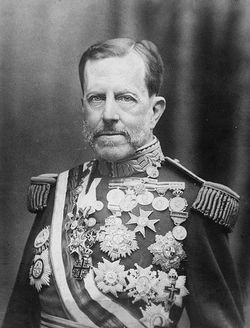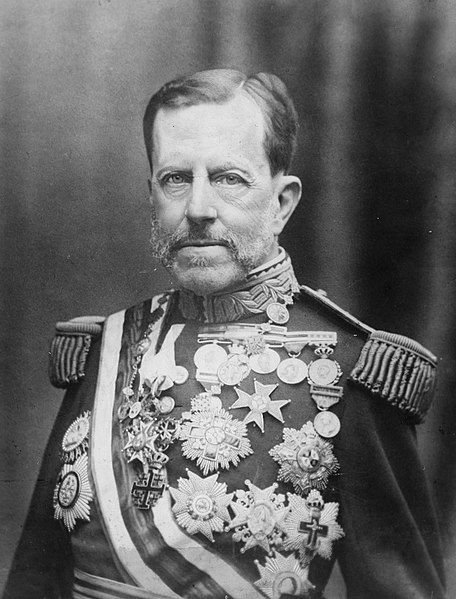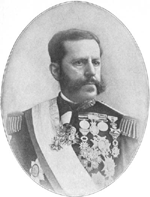Born at Palma de Majorca on September 17, 1838 to a Spanish mother and a German father, who was a military doctor, and educated in Granada. His family was originally Prussian, and had served in the Spanish army for several generations. At the age of 16 Weyler entered the military college of infantry at Toledo. When he attained the rank of lieutenant he entered the staff college, graduating as the head of his class. Two years afterwards he became captain, and was sent to Cuba at his own request. Weyler began herding farm people into what were called reconcentrados, concentration camps. He penned up about 500,000 Cubans in these camps. Between 200,000 and 400,000 Cuban civilians died from starvation and disease in these camps.
In 1888, he was sent out as captain-general to the Philippines, where he dealt very sternly with the native rebels of the Carolines, of Mindanao. in Manila, he lived as a poor man and returned to Spain a millionaire, through bribery and gifts of diamonds from Chinese Filipinos for favors and influences.
However, Weyler granted the petitions of 20 young women of Malolos, Bulacan to have education and to have a night school. Many consider this as a turning point of the status of women in the Philippines to have the right to education. The original petition was denied by the parish priest of Malolos, who argued that women should always stay at home and take care of the family.
On his return to Spain in 1892, he was appointed to command the 6th Army Corps in the Basque Provinces and Navarre, where he soon quelled agitations. He was then made captain-general at Barcelona, where he remained until January 1896. In Catalonia, with a state of siege, he made himself the terror of the anarchists and socialists.
After Marshal Campos had failed to pacify the Cuban rebellion, the Conservative government of Antonio Cánovas del Castillo sent out Weyler. This selection met the approval of most Spaniards, who thought him the proper man to crush the rebellion. While serving as a Spanish general, he was called "Butcher Weyler" because hundreds of thousands of people died in his concentration camps.
He was made governor of Cuba with full powers to suppress the insurgency and restore the island to political order and its sugar production to greater profitability. Initially, Weyler was greatly frustrated by the same factors that had made victory difficult for all generals of traditional standing armies fighting against an insurgency. While the Spanish troops marched in regulation and required substantial supplies, their opponents practiced hit-and-run tactics and lived off the land, blending in with the non-combatant population. He came to the same conclusions as his predecessors as well--that to win Cuba back for Spain, he would have to separate the rebels from the civilians by putting the latter in safe havens, protected by loyal Spanish troops. By the end of 1897, General Weyler had relocated more than 300,000 into such "reconcentration camps." Weyler learned this tactic from the campaign of General Sherman while assigned to the post of military attaché in the Spanish Embassy in Washington D.C.. However, many mistakenly believe him to be to the origin of such tactics after it was later used by the British in the Second Boer War and later evolved into a designation to describe the concentration camps of the 20th century regimes of Hitler and Stalin. Although he was successful moving vast numbers of people, he failed to provide for them adequately. Consequently, these areas became cesspools of hunger and disease, where many hundreds of thousands died.
Weyler's "reconcentration" policy had another important effect. Although it made Weyler's military objectives easier to accomplish, it had devastating political consequences. Although the Spanish Conservative government supported Weyler's tactics wholeheartedly, the Liberals denounced them vigorously for their toll on the Cuban civilian population. In the propaganda war waged in the United States, Cuban émigrés made much of Weyler's inhumanity to their countrymen and won the sympathy of broad groups of the U.S. population to their cause. He was nicknamed "the Butcher" Weyler by yellow journalists like William Randolph Hearst.
Weyler's strategy also backfired militarily due to the rebellion in the Philippines that required the redeployment by 1897 of some troops already in Cuba. When Prime Minister Antonio Cánovas del Castillo was assassinated in June, Weyler lost his principal supporter in Spain. He resigned his post in late 1897 and returned to Europe. He was replaced in Cuba by the more conciliatory Ramón Blanco y Erenas.
After his return to Spain, his reputation as a strong and ambitious soldier made him one of those who, in case of any constitutional disturbance, might be expected to play an important role, and his political position was nationally affected by this consideration; his appointment in 1900 as captain-general of Madrid resulted indeed in more than one ministerial crisis. He was minister of war for a short time at the end of 1901, and again in 1905. At the end of October 1909 he was appointed captain-general at Barcelona, where the disturbances connected with the execution of Francisco Ferrer were quelled by him without bloodshed.
He was charged, imprisoned and released for opposing the military dictator Miguel Primo de Rivera in the 1920s.
He died in Madrid on 20 October 1930. He was buried the next day in a simple casket without state ceremony. Few people attended.
wilkipedia
Born at Palma de Majorca on September 17, 1838 to a Spanish mother and a German father, who was a military doctor, and educated in Granada. His family was originally Prussian, and had served in the Spanish army for several generations. At the age of 16 Weyler entered the military college of infantry at Toledo. When he attained the rank of lieutenant he entered the staff college, graduating as the head of his class. Two years afterwards he became captain, and was sent to Cuba at his own request. Weyler began herding farm people into what were called reconcentrados, concentration camps. He penned up about 500,000 Cubans in these camps. Between 200,000 and 400,000 Cuban civilians died from starvation and disease in these camps.
In 1888, he was sent out as captain-general to the Philippines, where he dealt very sternly with the native rebels of the Carolines, of Mindanao. in Manila, he lived as a poor man and returned to Spain a millionaire, through bribery and gifts of diamonds from Chinese Filipinos for favors and influences.
However, Weyler granted the petitions of 20 young women of Malolos, Bulacan to have education and to have a night school. Many consider this as a turning point of the status of women in the Philippines to have the right to education. The original petition was denied by the parish priest of Malolos, who argued that women should always stay at home and take care of the family.
On his return to Spain in 1892, he was appointed to command the 6th Army Corps in the Basque Provinces and Navarre, where he soon quelled agitations. He was then made captain-general at Barcelona, where he remained until January 1896. In Catalonia, with a state of siege, he made himself the terror of the anarchists and socialists.
After Marshal Campos had failed to pacify the Cuban rebellion, the Conservative government of Antonio Cánovas del Castillo sent out Weyler. This selection met the approval of most Spaniards, who thought him the proper man to crush the rebellion. While serving as a Spanish general, he was called "Butcher Weyler" because hundreds of thousands of people died in his concentration camps.
He was made governor of Cuba with full powers to suppress the insurgency and restore the island to political order and its sugar production to greater profitability. Initially, Weyler was greatly frustrated by the same factors that had made victory difficult for all generals of traditional standing armies fighting against an insurgency. While the Spanish troops marched in regulation and required substantial supplies, their opponents practiced hit-and-run tactics and lived off the land, blending in with the non-combatant population. He came to the same conclusions as his predecessors as well--that to win Cuba back for Spain, he would have to separate the rebels from the civilians by putting the latter in safe havens, protected by loyal Spanish troops. By the end of 1897, General Weyler had relocated more than 300,000 into such "reconcentration camps." Weyler learned this tactic from the campaign of General Sherman while assigned to the post of military attaché in the Spanish Embassy in Washington D.C.. However, many mistakenly believe him to be to the origin of such tactics after it was later used by the British in the Second Boer War and later evolved into a designation to describe the concentration camps of the 20th century regimes of Hitler and Stalin. Although he was successful moving vast numbers of people, he failed to provide for them adequately. Consequently, these areas became cesspools of hunger and disease, where many hundreds of thousands died.
Weyler's "reconcentration" policy had another important effect. Although it made Weyler's military objectives easier to accomplish, it had devastating political consequences. Although the Spanish Conservative government supported Weyler's tactics wholeheartedly, the Liberals denounced them vigorously for their toll on the Cuban civilian population. In the propaganda war waged in the United States, Cuban émigrés made much of Weyler's inhumanity to their countrymen and won the sympathy of broad groups of the U.S. population to their cause. He was nicknamed "the Butcher" Weyler by yellow journalists like William Randolph Hearst.
Weyler's strategy also backfired militarily due to the rebellion in the Philippines that required the redeployment by 1897 of some troops already in Cuba. When Prime Minister Antonio Cánovas del Castillo was assassinated in June, Weyler lost his principal supporter in Spain. He resigned his post in late 1897 and returned to Europe. He was replaced in Cuba by the more conciliatory Ramón Blanco y Erenas.
After his return to Spain, his reputation as a strong and ambitious soldier made him one of those who, in case of any constitutional disturbance, might be expected to play an important role, and his political position was nationally affected by this consideration; his appointment in 1900 as captain-general of Madrid resulted indeed in more than one ministerial crisis. He was minister of war for a short time at the end of 1901, and again in 1905. At the end of October 1909 he was appointed captain-general at Barcelona, where the disturbances connected with the execution of Francisco Ferrer were quelled by him without bloodshed.
He was charged, imprisoned and released for opposing the military dictator Miguel Primo de Rivera in the 1920s.
He died in Madrid on 20 October 1930. He was buried the next day in a simple casket without state ceremony. Few people attended.
wilkipedia
Sponsored by Ancestry
Advertisement
Advertisement




